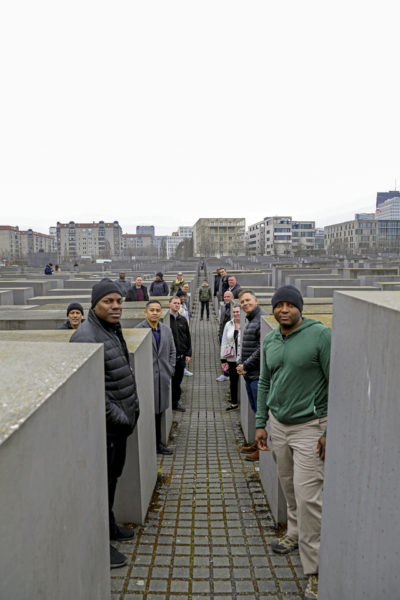
The 21st Theater Sustainment Command Equal Opportunity staff hosted military equal opportunity professionals from the European theater in Berlin, March 15-18, to train and share best practices on improving diversity, equity and inclusion across the force.
Symposium participants met with Anselm Beach, Senior Advisor to the Secretary of the Army for Diversity and Inclusion and Col. Caprissa Brown-Slade, Chief Diversity Officer, Deputy Assistant Secretary of the Army Equity and Inclusion Agency, as well as U.S. Army Europe-Africa MEO and Equal Employment Opportunity leaders.
Beach and Brown-Slade provided insight into Department of Defense and U.S. Army policy updates and regulations. They encouraged participants to be agents of change by taking information back to their commands and clarifying Army objectives and initiatives like Project Inclusion.
“When we’re talking about equity, what we are talking about is how we ensure we move beyond equality to provide people with the tools, the systems, the framework that they need to get the job done,” said Beach. “Not because somebody needs something extra, but because we are providing them what they need to deliver an outcome for the Army.”
Beach used M16 equipment given to left handed firers as an example of building equity.
“M16s were designed for right handed firers,” said Beach. “So, left handed firers would be given a little device to clip in the hand grip to prevent shell casings from hitting them in the face,” he said. “Equity is when we fill in the gap to make sure that everyone has what they need to perform in the maximum effective way for the Army.”
Beach stressed that diversity, equity and inclusion is not affirmative action.
“Dispel that myth,” he said. “Make sure that people have correct information. When we talk about diversity equity and inclusion in our Army, we are not talking about numbers. We are talking about a framework by which we build cohesive teams and inclusive environments where we fight and win our nation’s wars. Diversity, equity and inclusion is all about readiness, and always has been.”
Master Sgt. Carlos Retana, 10th Army Air and Missile Defense Command, has seen the positive impact the equal opportunity program has had on unit readiness and individual soldiers.
“When you’re doing your job appropriately, and helping commanders understand the regulations, what they can and cannot do, giving them strategies on how to address issues and also giving the information to Soldiers, you can see the command climate change,” said Retana. “You can see commanders changing the way they handle things. We [equal opportunity advisors] help empower them by giving them tools to approach different subjects and problems in different manners.
“I’ve seen change to the point that it has saved careers. With units, I’ve seen the climate change from Soldiers wanting to get out, to retention rates and morale rising because of small changes within the command that let Soldiers know their commanders care, that their problems are important.”
The symposium was the first formal EO training opportunity in nearly three years for 7th Mission Support Command’s Master Sgt. Keather Mitchell. The sessions helped her better understand the diversity and inclusion framework.
“We are bringing in diverse soldiers, but are we utilizing their talents?” asked Mitchell. “Are we hearing their thoughts? Are we including what they believe will improve the unit and lead to a positive environment? If we are not doing those things, we are not getting the maximum return on diversity.”
USAREUR-AF Equal Opportunity Program Manager Lt. Col. Garry Dodard, said equal opportunity advisors are key in helping commanders understand that point.
“If our Service Members are feeling that they are part of the team…..if they are feeling that they are part of an inclusive organization, then you’re going to see productivity go up,” said Dodard. He added much of the work EOAs do is not always reflected in reports.
“Sometimes the formal data does not reflect the conflict resolution work that happens behind the scenes,” he said. “Commanders can feel confident and rest assured that EO professionals are working behind the scenes daily.”
Sgt. 1st Class Krista McDowell, 18th Military Police Brigade says that confidence goes both ways. She appreciates command support for training, so she can better educate her unit.
“I am very passionate about this job,” said McDowell. “I went to an all-white school, and when I entered the military it was the first time I was ever around diverse people. The equal opportunity program has really made me see things differently. I am a better leader today then I was 10 years ago.”
207th Military Intelligence Brigade EOA Sgt. 1st Class Annie Tafolla appreciated the opportunity the symposium provided to network with more experienced EOAs like McDowell.
“Sometimes you only see things a certain way from your foxhole,” she said. “New people can learn from seasoned professionals. It’s amazing to see all of this talent merge together and create this amazing environment. It’s really important to learn best practices from other individuals. I hope to take back what I’ve learned to my commander and start implementing those best practices.”
21st TSC EO Program Manager Lt. Col. Hardy Johnson said connecting the EOAs stationed in Europe was an important symposium objective, as the past three years of COVID regulations limited training events and face to face interactions. Additional objectives were to empower EOAs and heighten awareness of their role.
“The value that equal opportunity advisors bring to any command is to be the eyes and ears of the command, and know what is truly going on,” said Johnson. According to Johnson, the training provided will help participants ensure regulatory compliance, conduct education and outreach activities and develop action plans to fulfill commanders’ intent.







